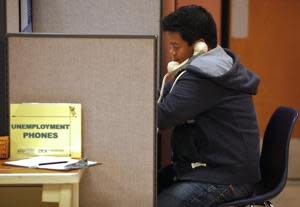 The Lookout
The LookoutJobless rate falling for those with college degrees, rising for those without

We've written before about how, despite the impression you might get from some sectors of the media, Americans without a college degree have been hit harder by the Great Recession and its aftermath than those with college-level educations.
And as David Leonhardt of the New York Times notes, Friday's jobs report shows that in recent months, the already wide employment gap between the two has been getting wider still.
For Americans with college degrees, the employment situation is improving slightly: 74 percent had jobs in May, up from 73.5 percent in April and 73.2 percent in January.
It's a different story for those without the degree. Of people who went to college but didn't graduate, 64.1 percent had a job last month, down from 64.6 percent in January. Among high school grads who didn't attend college, 54.6 percent had a job in May, the same as in January. And only 38.5 percent of high school dropouts were employed, down from 38.7 percent in January.
Those changes may seem relatively small. But they're exacerbating what was already a massive disparity in employment in this country.
And it goes deeper than the basic question of whether or not college grads or non-grads have jobs. As Leonhardt notes, for the employed, the pay gap between the two groups is near an all-time high. That's in part because non-skilled workers--typically people without college degrees--increasingly find themselves in competition with cheaper foreign labor or with machines, which drives down wages. That hasn't happened to the same extent for skilled, college-educated workers.
Meanwhile, for those without jobs, there's not much reason for optimism. The May report shows that the average duration of unemployment has reached a new record of 39.7 weeks.
(Jonathan Velazquez, who lost his job in finance, phones in to get unemployment benefits at the Verdugo Job Center in Glendale, Calif., Feburary 2011: Damian Dovarganes/AP)
